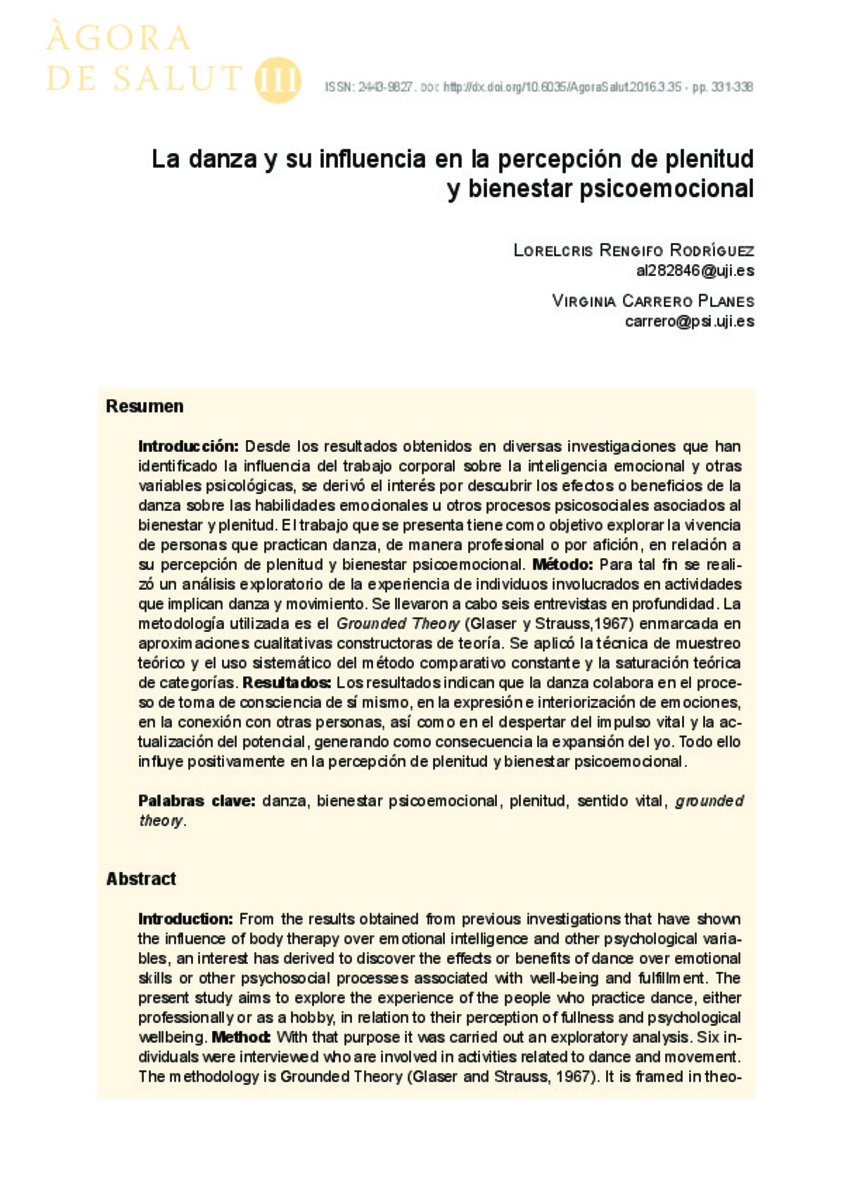Mostrar el registro sencillo del ítem
La danza y su influencia en la percepción de plenitud y bienestar psicoemocional.
| dc.contributor.author | Rengifo Rodríguez, Lorelcris | |
| dc.contributor.author | Carrero Planes, Virginia | |
| dc.date.accessioned | 2016-03-30T10:15:51Z | |
| dc.date.available | 2016-03-30T10:15:51Z | |
| dc.date.issued | 2016 | |
| dc.identifier.issn | 2443-9827 | |
| dc.identifier.uri | http://hdl.handle.net/10234/155766 | |
| dc.description.abstract | Introducción: Desde los resultados obtenidos en diversas investigaciones que han identificado la influencia del trabajo corporal sobre la inteligencia emocional y otras variables psicológicas, se derivó el interés por descubrir los efectos o beneficios de la danza sobre las habilidades emocionales u otros procesos psicosociales asociados al bienestar y plenitud. El trabajo que se presenta tiene como objetivo explorar la vivencia de personas que practican danza, de manera profesional o por afición, en relación a su percepción de plenitud y bienestar psicoemocional. Método: Para tal fin se realizó un análisis exploratorio de la experiencia de individuos involucrados en actividades que implican danza y movimiento. Se llevaron a cabo seis entrevistas en profundidad. La metodología utilizada es el Grounded Theory (Glaser y Strauss,1967) enmarcada en aproximaciones cualitativas constructoras de teoría. Se aplicó la técnica de muestreo teórico y el uso sistemático del método comparativo constante y la saturación teórica de categorías. Resultados: Los resultados indican que la danza colabora en el proceso de toma de consciencia de sí mismo, en la expresión e interiorización de emociones, en la conexión con otras personas, así como en el despertar del impulso vital y la actualización del potencial, generando como consecuencia la expansión del yo. Todo ello influye positivamente en la percepción de plenitud y bienestar psicoemocional. | ca_CA |
| dc.description.abstract | Introduction: From the results obtained from previous investigations that have shown the influence of body therapy over emotional intelligence and other psychological variables, an interest has derived to discover the effects or benefits of dance over emotional skills or other psychosocial processes associated with well-being and fulfillment. The present study aims to explore the experience of the people who practice dance, either professionally or as a hobby, in relation to their perception of fullness and psychological wellbeing. Method: With that purpose it was carried out an exploratory analysis. Six individuals were interviewed who are involved in activities related to dance and movement. The methodology is Grounded Theory (Glaser and Strauss, 1967). It is framed in theorethical builder qualitative approaches. It was applied theoretical sampling technique, systematic use of constant comparative method and theoretical saturation of categories. Results: The results indicate that dance collaborates in the process of making selfconsciousness, in the emotional expression and internalisation, in the connection with other persons, as well as in the vital force awakening and the potential update. As a consequence it generates the expansion of self. These aspects have a positive influence on the perception of wholeness and psycho-emotional wellbeing. | ca_CA |
| dc.format.extent | 8 p. | ca_CA |
| dc.format.mimetype | application/pdf | ca_CA |
| dc.language.iso | spa | ca_CA |
| dc.publisher | Universitat Jaume I | ca_CA |
| dc.relation.isPartOf | Àgora de salut vol. III | ca_CA |
| dc.rights | © Del text: els autors i les autores, 2016 © D’aquesta edició: Publicacions de la Universitat Jaume I, 2016 | ca_CA |
| dc.rights.uri | http://creativecommons.org/licenses/by-sa/4.0/ | * |
| dc.subject | danza | ca_CA |
| dc.subject | bienestar psicoemocional | ca_CA |
| dc.subject | plenitud | ca_CA |
| dc.subject | sentido vital | ca_CA |
| dc.subject | grounded theory | ca_CA |
| dc.subject | dance | ca_CA |
| dc.subject | psycho-emotional wellbeing | ca_CA |
| dc.subject | wholeness | ca_CA |
| dc.subject | life force | ca_CA |
| dc.subject | Grounded Theory | ca_CA |
| dc.title | La danza y su influencia en la percepción de plenitud y bienestar psicoemocional. | ca_CA |
| dc.type | info:eu-repo/semantics/article | ca_CA |
| dc.identifier.doi | http://dx.doi.org/10.6035/AgoraSalut.2016.3.35 | |
| dc.rights.accessRights | info:eu-repo/semantics/openAccess | ca_CA |








